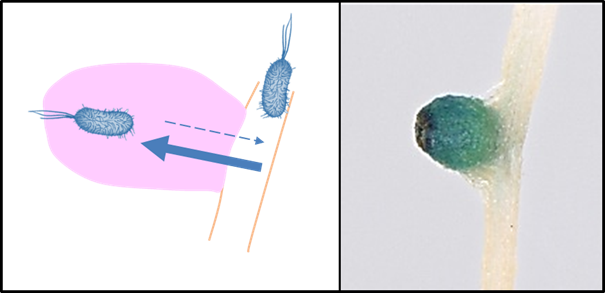Not so (immuno)depressed these nodules!
Some plants, including legume plants, are able to host mutualistic bacterial partners in symbiotic root nodules. This interaction gives rise to exchanges: the bacteria supply nitrogen to the plants, which in return give them nutrients. The nutritional benefit for plants is important when the microbial population is massive. This apparent "hospitality" is made possible thanks to a specific regulation of the plant innate immunity in the nodules.
Benjamin Gourion (Laboratoire des Interactions Plantes Micro-organismes, Toulouse) in collaboration with Pascal Ratet’s team (Institut des Sciences des Plantes Paris Saclay) assessed the impact of this immunosuppression on the vulnerability of symbiotic organs. An innovative biological system was developed for this purpose, which involves the legume Medicago truncatula, its bacterial partner Sinorhizobium medicae and the pathogenic bacterium Ralstonia solanacearum. The results of this study (Benezech et al. 2020) show that nodules represent important infection and multiplication sites for the pathogen. However, transcriptome analyses suggest that symbiotic nodules do develop defense responses, even though these appear to be relatively weak and based on a different genetic program than for the root response to the same pathogen. Interestingly, the study also shows that the susceptibility of the nodules to pathogenic infections is counterbalanced by a mechanism that delays the spread of pathogens from the symbiotic organ to the rest of the plant. This mechanism remains however to be characterized.
Contact : benjamin.gourion @ inra.fr and/or pascal.ratet@ips2.universite-paris-saclay.fr

C. Benetzech has shown in this study that there is a mechanism in nodosity that delays the spread of the pathogen to the plant
